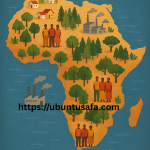Africa's Pre-Colonial Era- "Before the Colonizers: Africa’s Forgotten Empires and Innovators" Rediscovering our roots beyond slavery.

These facts reflects the historical period before widespread European colonization and the transatlantic slave trade profoundly reshaped the African continent.
This approach aligns with the spirit of "rediscovering our roots beyond slavery"
Before the Colonizers: Africa’s Forgotten Empires and Innovators
For centuries, the narrative of Africa has often been tragically constrained by the shadows of the transatlantic slave trade and subsequent European colonization. Yet, long before the arrival of colonizers, the continent was a vibrant tapestry of sophisticated empires, advanced civilizations, and groundbreaking innovators whose contributions to human knowledge and culture are only now beginning to be fully appreciated. Rediscovering these roots is not just an academic exercise; it is an essential reclaiming of history and identity.
Great Empires of Gold, Learning, and Power:
-
Ancient Egypt (c. 3100 BCE – 30 BCE): While often considered separately, Egypt is undeniably African. Its monumental architecture, advanced understanding of mathematics, medicine, and astronomy, and complex social and religious structures laid foundations for civilizations worldwide. The Library of Alexandria, though Hellenistic in its later iterations, was a beacon of knowledge on African soil.
-
The Kingdom of Kush (c. 1070 BCE – 350 CE): South of Egypt, in modern-day Sudan, Kush rivaled its northern neighbor. Known for its skilled archers, iron production, and pyramids (more numerous than Egypt's, though smaller), Kush maintained a distinct cultural identity and even ruled Egypt for a period as the 25th Dynasty.
-
The Aksumite Empire (c. 100 CE – 940 CE): Located in present-day Ethiopia and Eritrea, Aksum was a major naval and trading power, controlling routes between Africa and Asia. It developed its own script (Ge'ez), minted its own coins, and was one of the first empires to officially adopt Christianity, building impressive rock-hewn churches that still stand today.
-
The Ghana Empire (c. 300 CE – 1200 CE): Flourishing in West Africa, this empire grew rich from the trans-Saharan gold and salt trade. Its capital, Koumbi Saleh, was a bustling center of commerce and learning, attracting scholars and merchants from across the Islamic world.
-
The Mali Empire (c. 1230 CE – 1600 CE): Successor to Ghana, the Mali Empire under legendary rulers like Mansa Musa became arguably the wealthiest empire of its time. Mansa Musa's pilgrimage to Mecca, with his immense wealth, famously devalued gold in the regions he passed through. Timbuktu, a major city within the empire, became a renowned center of Islamic scholarship, housing universities and libraries that predated many in Europe.
-
The Songhai Empire (c. 1464 CE – 1591 CE): Following Mali, Songhai rose to prominence, extending its control over key trade routes and consolidating power. Under rulers like Askia the Great, it further developed Timbuktu and Djenné as intellectual and commercial hubs, promoting education and justice.
-
The Great Zimbabwe (c. 11th – 15th centuries CE): In Southern Africa, this powerful kingdom constructed massive stone enclosures without mortar, demonstrating remarkable architectural and engineering prowess. It was a hub for a vast trading network, exchanging gold and ivory with Swahili coast merchants.
-
The Kongo Kingdom (c. 1390 CE – 1914 CE): Located in Central Africa, this highly organized kingdom had a sophisticated political structure, a strong agricultural base, and intricate trade networks. It engaged with the Portuguese early on, showcasing the complexity of pre-colonial African diplomacy.
Innovators Beyond the Narrative:
Beyond the grand empires, countless African societies made significant advancements in various fields:
-
Metallurgy: The Nok culture of West Africa (c. 1000 BCE – 300 CE) was one of the earliest sub-Saharan African civilizations to smelt iron, a skill that spread across the continent and revolutionized agriculture, warfare, and tool-making. Evidence of sophisticated iron and steel production has been found in regions like Tanzania (Haya people) dating back over 2,000 years.
-
Agriculture: African communities developed diverse and resilient farming systems, domesticating indigenous crops like millet, sorghum, yams, and teff, adapting them to varied climates and terrains. Complex irrigation systems were also employed in many regions.
-
Mathematics and Astronomy: Evidence suggests ancient African knowledge of complex mathematical concepts, including fractals (as seen in some traditional architectural designs). Astronomical observations informed agricultural cycles and religious practices across various cultures.
-
Medicine: Traditional African medicine was highly developed, with knowledge of herbal remedies, surgical procedures (including successful C-sections documented in the 19th century among the Banyoro of Uganda), and inoculation techniques against diseases like smallpox, predating Western adoption.
-
Art and Architecture: From the intricate bronzes of Benin and Ife to the rock-hewn churches of Lalibela and the mud-brick mosques of Djenné, African artistic and architectural traditions are rich, diverse, and deeply symbolic, often reflecting complex spiritual and social structures.
-
Governance and Law: Many African societies developed sophisticated systems of governance, including federal structures, checks and balances, and customary law that ensured social cohesion and justice, often with strong emphasis on community participation and consensus-building.
Reclaiming the Narrative:
The tendency to view African history solely through the lens of slavery and colonization fundamentally distorts its reality. By highlighting these forgotten empires and innovators, we begin to reconstruct a more complete and accurate understanding of a continent that was, for millennia, a cradle of civilization, a hub of intellectual exchange, and a source of profound human achievement. This reclamation is vital for all of humanity to fully appreciate the shared heritage and diverse contributions that have shaped our world.
- Questions and Answers
- Opinion
- Motivational and Inspiring Story
- Technology
- Live and Let live
- Focus
- Geopolitics
- Military-Arms/Equipment
- Ασφάλεια
- Economy
- Beasts of Nations
- Machine Tools-The “Mother Industry”
- Art
- Causes
- Crafts
- Dance
- Drinks
- Film/Movie
- Fitness
- Food
- Παιχνίδια
- Gardening
- Health
- Κεντρική Σελίδα
- Literature
- Music
- Networking
- άλλο
- Party
- Religion
- Shopping
- Sports
- Theater
- Health and Wellness
- News
- Culture

